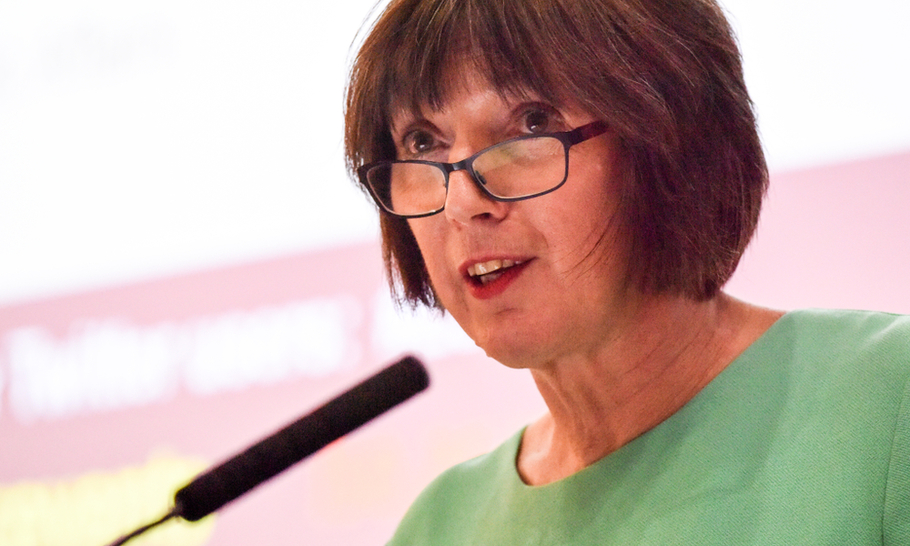If public sector unions strike over a pay freeze, they will make Boris’s day

Frances O'Grady, TUC. (Shutterstock)
So Christmas isn’t cancelled after all. If April was the cruelest month, as TS Eliot had it, November has been the bleakest so far in this Covid-cursed year. December promises to be better, but only if we behave ourselves in the shops, restaurants and pubs that are due to reopen — if, that is, they have not already gone bust. Festive cheer is to be strictly rationed, Christmas gatherings will be more bubbling than bubbly and spontaneous revelry of any sort is out. God rest you merry, we are to be told, let nothing you dismay — but don’t overdo it, or January will be as dismal as November.
Meanwhile, battle-lines are being drawn for a confrontation between unions and the Government over the public sector pay freeze that is expected to be announced this week. Frances O’Grady, the TUC General Secretary, has described the proposed return to austerity, after only a brief window of wage rises in the past year, as “morally obscene”. If four million state employees were made to suffer a real-terms pay cut, she warned of strikes to come, claiming widespread support for such disruption: “I’m really conscious of the feeling out there that governments only seem to recognise the true value of labour when it’s withdrawn.”
To which the 750,000 private sector workers who have actually been made unemployed so far this year might reply that unions only seem to recognise the true value of jobs when they cease to exist. The public sector has largely been protected from the economic shock of the pandemic, although many are more exposed to the virus than their private sector counterparts. Both sides of the public-private divide have legitimate grounds for resentment, but the only response that will carry the country through this crisis is a spirit of solidarity and self-sacrifice. Whatever the TUC may be hearing from its members, the other 60 million citizens of the UK are in no mood to have the insult of strikes added to the injury of Covid. Under the crippling rules of lockdown, most people known they are lucky to be working at all. They are unlikely to be tolerant of others in the public services “working to rule” or “withdrawing labour”.
If the trade unions decide that they will spoil next month’s frugal festivities and ruin the prospect of a vaccine-led recovery in 2021, they will soon find that public support for the public services is conditional, not absolute. The NHS is excluded from the pay freeze in recognition of the nation’s debt to its staff this year — but only provisionally. In general, the economic case for exempting those who work for the state from the consequences of the deepest recession in recent history is weak; the moral case is non-existent.
As this column outlined here last week, the culture that prevails in Whitehall and the wider public services is blind to its own comparative advantage. While salaries in public and private sectors are similar, averaging about £28,000 per annum, generous pensions and other benefits known as the “pay premium” tip the balance in favour of the public services to the tune of about seven per cent, according to the Office for National Statistics. And this premium does not even take into account the incomparably greater job security enjoyed by those whose salaries and pensions are paid by the taxpayer.
Remuneration at the very top of the tree is, of course, far greater in private enterprise, where rewards are supposed to be commensurate with risk. We do not normally pay public servants to take risks, but to minimise them. The barriers between private and public sectors have, however, become so blurred that former mandarins are as likely to find lucrative jobs in commerce as the other way around. A good example is the present CEO of John Lewis, Sharon White, who took over the ailing partnership after running the regulator Ofcom and serving as second Permanent Secretary at the Treasury. It is no longer the case that a talented person who opts for public service is thereby renouncing forever the opportunity to make a fortune in business.
Let us hope that common sense and the common good will bring people together. The UK is already disunited enough — over Covid and Brexit, between nations and regions, not to forget rich and poor — without the divide between private and public sectors widening to a chasm. We have been here before, in the 1970s and 1980s. And if union officials such as Frances O’Grady have forgotten what the consequences were then, they should ask Sir Keir Starmer. The Labour leader has already been compared to Neil Kinnock, who fought and lost two of the four successive elections won by Margaret Thatcher and John Major. As the European question fades into the background over the coming years, Boris Johnson will be on the lookout for a new enemy. Union militancy leading to strikes in the public services would provide him with the perfect target — and place Keir Starmer, who would be pulled in both directions, in an impossible position.
Coronavirus Christmas is surely not the right moment to return to the adversarial politics of the past. Many, if not most people are taking a pasting from the pandemic. The least they can expect from those who are not yet in the firing line is a period of silence.
A Message from TheArticle
We are the only publication that’s committed to covering every angle. We have an important contribution to make, one that’s needed now more than ever, and we need your help to continue publishing throughout the pandemic. So please, make a donation.





